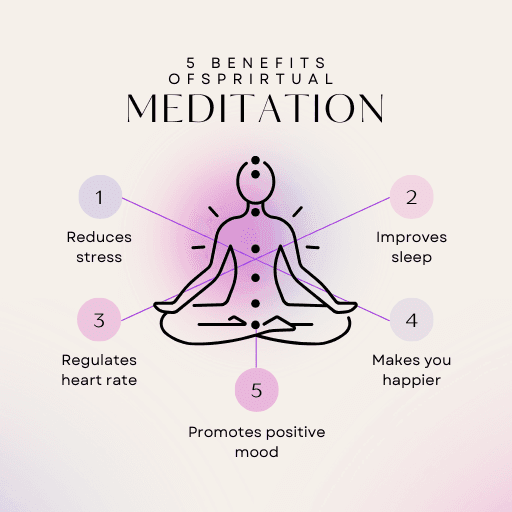In the fast-paced world we live in, taking time for oneself can seem like a luxury. However, spiritual meditation offers a path to inner peace, providing the space to reconnect with our deeper selves. This practice goes beyond typical relaxation techniques; it touches the core of our being and aligns us with a sense of purpose and tranquillity. Let’s explore the journey of spiritual meditation and how it can transform your life.
What Is Spiritual Meditation?

Spiritual meditation is a form of introspection that emphasizes self-awareness, connecting with a higher power, or understanding the essence of one’s soul. Unlike other types of meditation that focus on physical relaxation or mindfulness, spiritual meditation delves into the realm of deeper consciousness. It invites you to explore the questions of who you are, your place in the universe, and your spiritual truths.
Benefits of Spiritual Meditation
The benefits of spiritual meditation extend far beyond the immediate sense of calmness and relaxation.
- Regular practice can lead to a profound sense of clarity and purpose.
- It relieves stress, anxiety, and feelings of loneliness.
- By regularly meditating, you create a strong foundation of mental and emotional stability, allowing you to face life’s challenges with a calm and balanced mind.
- Additionally, spiritual meditation enhances self-awareness and acceptance, fostering a compassionate attitude towards yourself and others.
- When we connect with our spiritual core, we understand that we are part of a larger, interconnected universe, which can lead to a deeper appreciation for life and a sense of gratitude.

Getting Started: Simple Steps to Begin
Beginning your spiritual meditation journey doesn’t require any special equipment or prior experience. Here’s a simple approach to start your practice:
- Find a Quiet Space: Select a location free of interruptions. This can be a quiet room, a spot in nature, or any place where you feel comfortable and safe.
- Set an Intention: Before starting, set a clear intention for your meditation. It could be to seek peace, clarity, or spiritual guidance.
- Concentrate on your breathing: Close your eyes and take deep, steady breaths. As you breathe in and out, allow yourself to let go of any tension and thoughts cluttering your mind.
- Connect with a Higher Power or Your Inner Self: Depending on your beliefs, visualize connecting with a higher power, or simply focus on the essence of your being. Feel the energy flowing through you, guiding you to a deeper sense of peace and understanding.
- Be Open to Insights: As you settle into meditation, be open to any insights, thoughts, or feelings that arise. Don’t judge or analyze them; simply observe and let them pass.
- End with Gratitude: Conclude your session by expressing gratitude for the experience. This will help ground your practice and carry positive energy into your daily life.
Overcoming Challenges
Like any new practice, you might face challenges when starting spiritual meditation. Restlessness, a wandering mind, or frustration are all normal. Instead of resisting these feelings, acknowledge them as part of the process. Over time, your practice will become easier, and the distractions will fade away as your ability to focus strengthens.
Final Thoughts
Spiritual meditation is more than just a relaxation technique; it’s a journey of self-discovery and a path to connect with the higher truths of life. By embracing this practice, you open the door to a deeper understanding of yourself and the world around you. So take a deep breath, close your eyes, and allow yourself to explore the endless possibilities within your own consciousness.
Incorporate spiritual meditation into your daily routine, and witness the transformation it brings—a life of purpose, peace, and profound contentment.


